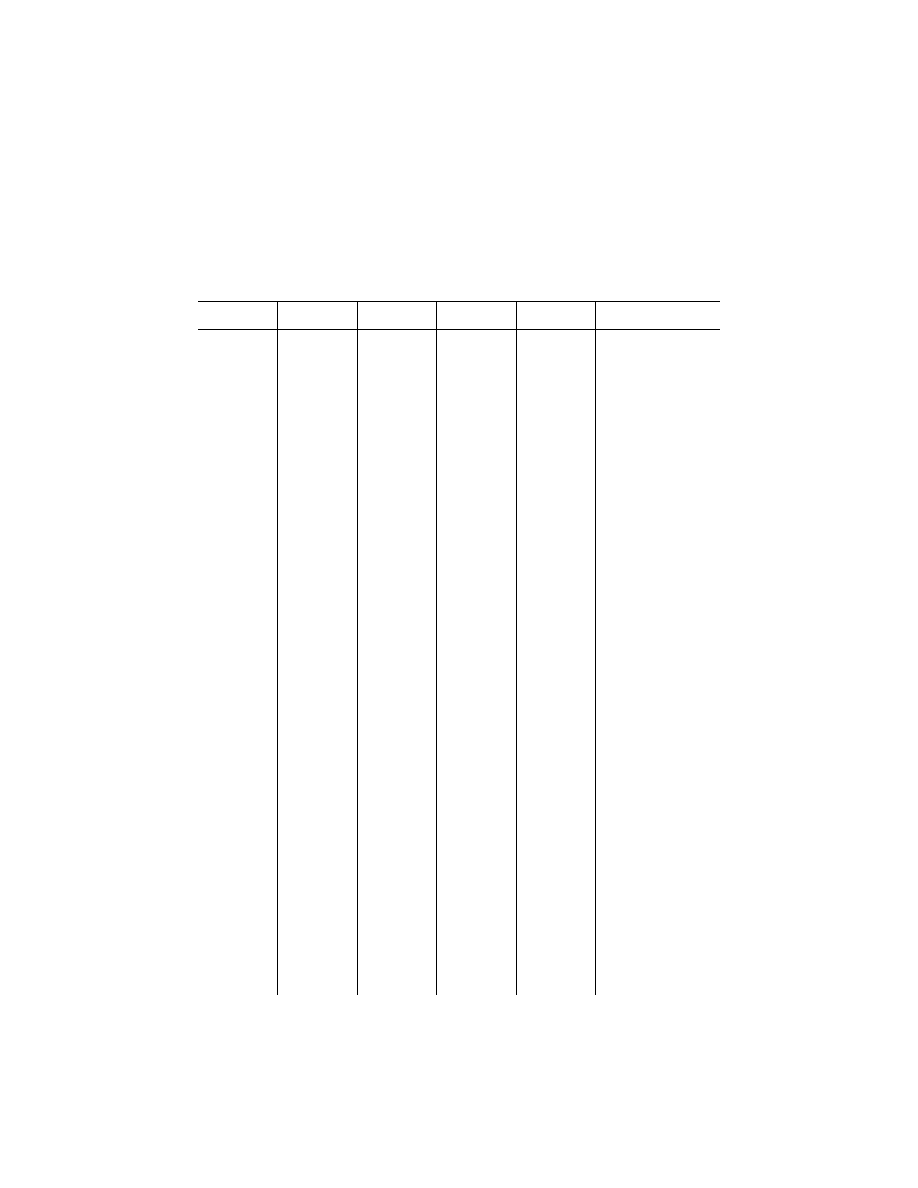
300
14 CFR Ch. I (1–1–19 Edition)
Pt. 121, App. M
The recorded values must meet the designated range, resolution and accuracy requirements during static and dynamic condi-
tions. Dynamic condition means the parameter is experiencing change at the maximum rate attainable, including the maximum
rate of reversal. All data recorded must be correlated in time to within one second.
Parameters Range
Accuracy (sensor
input)
Seconds per
sampling interval
Resolution Remarks
16. Lateral control
surface(s) posi-
tion.
7 18
Full Range .........
±
2
°
unless high-
er accuracy
uniquely re-
quired.
0.5 or 0.25 for
airplanes oper-
ated under
§ 121.344(f).
0.3% of full
range.
A suitable combination of
surface position sensors is
acceptable in lieu of re-
cording each surface sepa-
rately. The control surfaces
may be sampled alter-
nately to produce the sam-
pling interval of 0.5 or
0.25, as applicable.
17. Yaw control
surface(s) posi-
tion.
8 18
Full Range .........
±
2
°
unless high-
er accuracy
uniquely re-
quired.
0.5 .....................
0.2% of full
range.
For airplanes with multiple or
split surfaces, a suitable
combination of surface po-
sition sensors is accept-
able in lieu of recording
each surface separately.
The control surfaces may
be sampled alternately to
produce the sampling inter-
val of 0.5.
18. Lateral Accel-
eration.
±
1g ....................
±
1.5% max.
range exclud-
ing datum
error of
±
5%.
0.25 ...................
0.004g
19. Pitch Trim
Surface Posi-
tion.
Full Range .........
±
3
°
Unless High-
er Accuracy
Uniquely Re-
quired.
1 ........................
0.6% of full
range.
20. Trailing Edge
Flap or Cockpit
Control Selec-
tion.
10
.
Full Range or
Each Position
(discrete).
±
3
°
or as Pilot’s
indicator.
2 ........................
0.5% of full
range.
Flap position and cockpit
control may each be sam-
pled at 4 second intervals,
to give a data point every
2 seconds.
21. Leading Edge
Flap or Cockpit
Control Selec-
tion.
11
.
Full Range or
Each Discrete
Position.
±
3
°
or as Pilot’s
indicator and
sufficient to
determine
each discrete
position.
2 ........................
0.5% of full
range.
Left and right sides, or flap
position and cockpit control
may each be sampled at 4
second intervals, so as to
give a data point every 2
seconds.
22. Each Thrust
Reverser Posi-
tion (or equiva-
lent for pro-
peller airplane).
Stowed, In Tran-
sit, and Re-
verse (Dis-
crete).
...........................
1 (per engine) ...
...........................
Turbo-jet—2 discretes enable
the 3 states to be deter-
mined.
Turbo-prop—discrete.
23. Ground spoil-
er position or
brake selec-
tion
12
.
Full range or
each position
(discrete).
±
2
°
Unless high-
er accuracy
uniquely re-
quired.
1 or 0.5 for air-
planes oper-
ated under
§ 121.344(f).
0.5% of full
range.
24. Outside Air
Temperature or
Total Air Tem-
perature.
13
.
¥
50
°
C to + 90
°
C.
±
2
°
C .................
2 ........................
0.3
°
C ................
25. Autopilot/
Autothrottle/
AFCS Mode
and Engage-
ment Status.
A suitable com-
bination of
discretes.
...........................
1 ........................
...........................
Discretes should show which
systems are engaged and
which primary modes are
controlling the flight path
and speed of the aircraft.
26. Radio Alti-
tude
14
.
¥
20 ft to 2,500
ft.
±
2 ft or
±
3%
whichever is
greater below
500 ft and
±
5% above
500 ft.
1 ........................
1 ft + 5% above
500 ft.
For autoland/category 3 op-
erations. Each radio altim-
eter should be recorded,
but arranged so that at
least one is recorded each
second.
VerDate Sep<11>2014
08:20 May 17, 2019
Jkt 247048
PO 00000
Frm 00310
Fmt 8010
Sfmt 8002
Y:\SGML\247048.XXX
247048